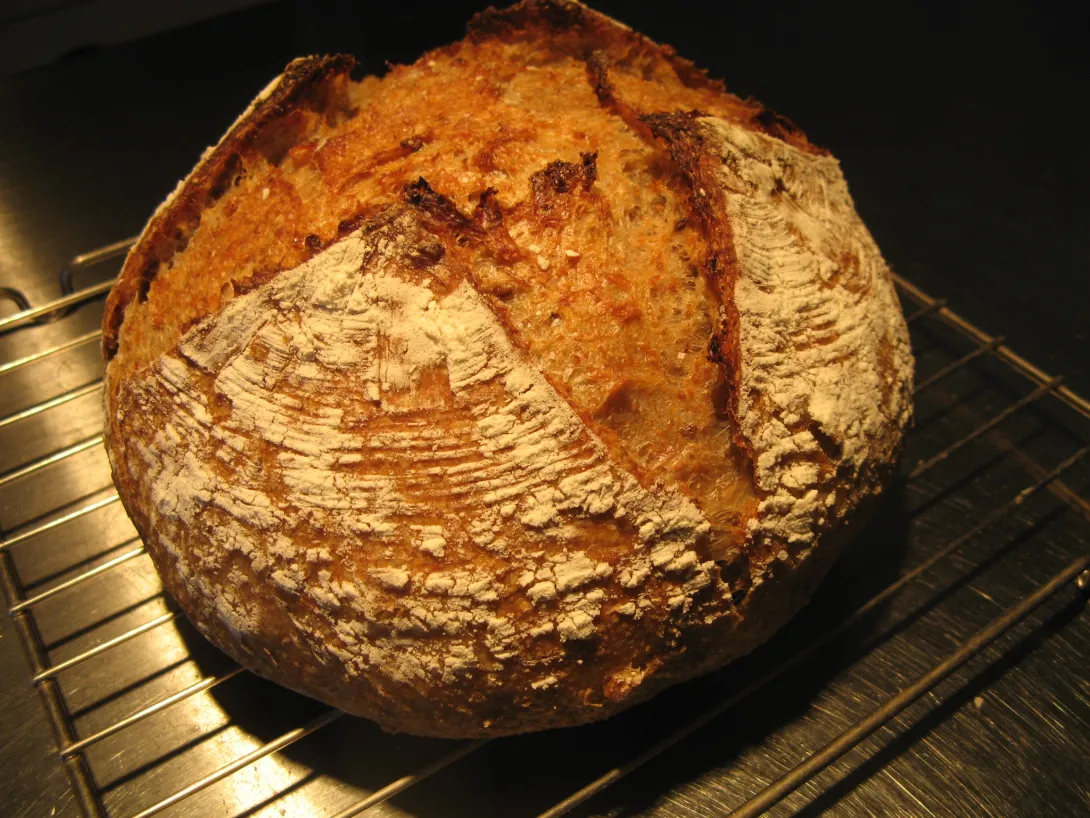
I really like making porridge breads - they allow the flavour of whatever grain is in the porridge while keeping the texture of a nice wheat-based sourdough. Creamy, moist, chewy and with a nice crust. I especially like using rye flakes this way as rye flour can be notoriously difficult to work with and really changes the texture of the bread.
Today I baked a batch of Rye Porridge bread a la Tartine 3. However, I've also been inspired by reading about Swedish breads with rye, orange and different fragrant seeds. So instead of adding nuts and flavoured oil as Robertson suggests in the rye porridge bread, I added orange zest (grated, dehydrated), toasted anise and fennel seeds (crushed in a mortar) and some chopped candied citrus peel. I really don't know how it's going to taste but it smells absolutely wonderful! I baked it in cast iron pots and I'm very happy with the appearance (oven spring, crust) as well.
If there is any left from the bread shop / market tomorrow I might keep one and cut it to check on the crumb. Otherwise I'll just trust to experience that it will be fit for my customers. I know, taking a bit of a risk doing this but life needs a little risk sometimes, right? :)
- Lazy Loafer's Blog
- Log in or register to post comments
I really hope that you get to try a slice and let us know how it tastes!
cocky! Brazenly baking off beateous boules, but bravely letting the buyers of the bread be first to savour a bite... (seriously out of "b" words now...)
Gorgeous looking loaves, and the idea sounds like it must taste wonderful. I doubt that you'll have any left over, but maybe one of your customers might be willing to share a crumb shot and a taste for you ;) It's gotta be a great feeling when you are so comfortable with your craft that you can make and sell a brand new creation without needing to test it out on yourself first.
Nice job - and have fun at the market tomorrow (and I hope that you aren't roasting there as much as we are here)
Interesting flavour combination. Please tell us the taste!
You gave me some ideas for my future bakes. I have a small mill so I can mill very coarse and I do it usually with the rye grains. In a month or two we will have some home grown citrus fruits which I can also put in my bread.
The boules look amazing and I would be very proud to get all so evenly baked and scored.
Well done Lazy Loafer and happy baking,
Joze
I have asked one of my customers to send me a crumb shot and some tasting notes. He bought several loaves at the shop on Saturday and has frozen this one for future, so I might have to wait a bit, but I'll let everyone know what I hear back!
Looks great! I have a new porridge bread concoction ready to go in the oven tonight.
Regards,
Ian
My customer sent me a snapshot and note regarding the bread:
Hmmm, another one where the photo ends up sideways. Oh well. Here is his note:
Great, daring, consistent work, and beautifully described. I have found the porridge to be quite difficult to work with because it's so gummy and clumpy, whereas soakers are perfectly reliable and give qualities the same as or similar to what you describe. Do you find any big difference between porridge and soakers in the final product?
I sort of do a hybrid now, cooking the flakes just briefly until all the water is pretty much absorbed then allowing it to cool. And I do the sacrilegious thing of mixing the porridge into the water with the starter, then adding the flour. I know this affects the gluten development but I find it so much easier to get a smooth consistent dough this way, rather than clumps of porridge. Especially as I usually make at least four and up to twelve in a batch. Too hard to mix porridge into finished dough in those proportions!
I usually soak cracked grains and multi-grain cereal rather than cooking it. Weird, I know, as you think these things would be better cooked. Rye grain is the exception, whether whole or cracked. I find it just too hard even when soaked overnight. Kamut can be the same, but I usually use kamut as flour or flakes.
Thanks, that very instructive, and aligns with my experience. I, too mix soakers and porridges when mixing the final dough. I tried mixing them after the second fold, and found it too hard to get a thorough mix before the dough tightens. I've never had a problem with my rye flakes not falling apart, though. One person I baked with used a lot more water than Hamelman would call for, and simply weighed out the desired amount. This worked fine, since I inevitably add hydration anyway.
i always mix the porridge at the same time I mix in the starter and the second amount of water. I have never had any issues doing it this way.